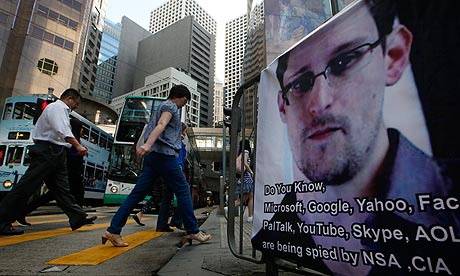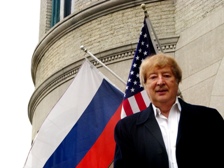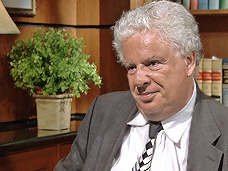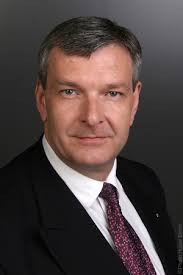
Published 18-06-2013, 10:41
 The growing furore over the US surveillance
program known as Prism raises many issues that go right to the core of
democracy.
The growing furore over the US surveillance
program known as Prism raises many issues that go right to the core of
democracy.
Former CIA employee Edward Snowden, now in hiding, alleges that the US National Security Agency (NSA) has direct access on a massive scale to servers of major technology companies including Microsoft, Yahoo, Google, Facebook, PalTalk, AOL, Skype, YouTube and Apple. If this allegation is correct, it means that US security agents are able to use stored and current data generated by individual chat logs, voice traffic, file transfers and social networking sites. The sources that broke this story also alleged – and the US government has since confirmed – that the NSA has access to the phone records of Verizon, Sprint and AT&T; this means that the NSA is able to determine from where and by whom a phone call is made, to which phone it is made, and how long the conversation lasted.
All the above-named companies have denied their involvement; and it is unknown how Prism, which was established in 2007, actually works. But according to Snowden, no one is free from surveillance regardless of what data protection he or she may have in place. And since many global technology companies are based in the US, any person in any country using their services can have his or her privacy violated.
Inevitably, Snowden is seen as a hero by his supporters but as a national traitor by his critics. He styles himself as a whistle-blower acting in the best public interest. And he has justified his actions by expressing concern about the actual or potential abuse of data collected in this way by security officials.
US Director of National Intelligence James Clapper has described the leaks as "gut wrenching” and "extremely damaging". Meanwhile, President Barack Obama has sought to reassure the US public by confirming that Prism is closely overseen by Congress and the courts. "You can't have 100% security and also then have 100% privacy and zero inconvenience”, he commented. Indeed, US officials have pointed out that Prism is legally sound, having been authorized under the Foreign Intelligence Surveillance Act (FISA).
Elsewhere, British Foreign Secretary William Hague conceded that British citizens are unable to "opt out” of being monitored but attempted to quell a public outcry in his country by stating that law-abiding citizens have nothing to worry about. For his part, President Vladimir Putin reacted in a similar manner, reminding the Russian public that the activities of Russia’s security agencies are strictly regulated by law.
Arguments on either side of the controversy are equally persuasive. Given that terrorists can use powerful communications technology to carry out lethal attacks, it is vital that security agencies use that technology too. Moreover, information gathered can be of use to those agencies only if they try to "connect the dots” when there is an a priori reason for doing so. Indeed, even when such a reason does exist, it can be that no action will be taken, as was demonstrated in the case of the recent Boston terrorist attacks. Both the US and Russian security agencies possessed potentially vital information about the alleged perpetrators and could have gathered and exchanged more; however, they failed to act on the information in their possession precisely because they judged there were insufficient reasons to do so.
At the same time, covert data-gathering on the scale alleged by Snowden paves the way for the abuse of the information collected. If virtually everything is known about any individual, it cannot be ruled out that a rogue entity or agent within a security force will use that information to discredit anyone, including politicians and other public figures. From this perspective, Prism could be seen as a giant government-financed "phishing” program, the very existence of which could have unpredictable consequences. Not only could it erode the foundations of democracy; it has the potential to realize George Orwell’s nightmare of a society controlled by Big Brother.
Questions:
- •Is democracy protected or threatened by modern communications technology?
- •Although Russian Foreign Affairs Minister Sergey Lavrov has denied rumors that Snowden is seeking political asylum in Russia, he indicated that the authorities would consider such a request if it were made. Should Russia risk another blow to US-Russian relations by even contemplating such a move?
 The topic for the Discussion Panel is provided by Vlad Sobell,
The topic for the Discussion Panel is provided by Vlad Sobell, Editor, Expert Discussion Panel
Professor, New York University, Prague
Editor, Consensus East-West Europe
Expert Panel Contributions
 Edward Lozansky
Edward LozanskyPresident, American University in Moscow
Professor of World Politics, Moscow State University
Lessons to be learned from the "Prism” scandal
The unfolding debate triggered by the defection of the National Security Agency (NSA) employee Edward Snowden, presumably to Hong Kong, addresses various intractable issues. Should we trade liberty for security and if so to what extent? It is practically impossible to give clear-cut answers to questions such as this one, at least not immediately. A long and painful debate is due, and there is unlikely to be a clear outcome.
I disagree with sensationalist statements about America becoming George Orwell’s totalitarian society controlled by Big Brother and resembling the Soviet Union. Unlike the USSR, which was indeed trying to control people’s lives and minds, the US government in exercising its responsibility for the nation’s security is obliged to use some of these albeit disturbing methods, as authorized by Congress, to protect us from terrorists. Indeed, as some US government officials are telling us – and there is no reason not to believe them – NSA monitoring has already averting dozens if not hundreds of devastating terror attacks, thus saving many lives and preventing damage to property.
This monitoring activity is hardly being conducted in an above board and democratic way, but it is up to the American people to decide whether they accept such methods.
The hypocrisy starts when America tries to teach other countries what their democracy should look like. Russia has been hit by terrorism many times and some of the methods used by the security agencies to crush terrorist networks certainly did not follow generally accepted democratic procedures. Many Russian terrorists, including the alleged perpetrators of the Boston attacks (the Tsarnaev brothers), have been given political asylum in the US and Europe and even grants and scholarships to study there.
Russia is frequently criticized for being thoroughly corrupt and indeed, corruption is a monstrous problem in that country. But the Kremlin is not pretending that this scourge does not exist and it is doing its best to fight it.
At the same time, who is immune? Google the words "Corruption in USA” and you will get 270 million links, most of which tell horrifying corruption stories close to home here.
The system provides ample opportunities for corruption. Members of Congress who lost elections migrate to lobbying firms with much more lucrative salaries to pressure active politicians to do favors for corporations and private contractors. Retired Pentagon generals frequently become CEOs and consultants for the military-industrial complex.
Edward Snowden, whom former Vice-President Cheney and many others call a traitor, was a private contractor for the company Booz Allen Hamilton, whose Deputy Chairman is former NSA and National Intelligence head John Michael "Mike” McConnell. Mr McConnell returned to Booz Allen in 2009, after he had left the government, and earned some $4.1 million in his first year back at that company.
As I stated above, America, of course, is not the Soviet Union. But there is a resemblance at least in one area. Just like the USSR and its efforts to spread Communist ideology and "liberate the oppressed masses from capitalist exploitation”, America continues to seek to export its form of democracy around the world, despite pitiful results in the post-Soviet space and the Middle East.
Besides being hypocritical, this policy is very dangerous – as can be seen from the horrific events in Georgia which almost got us in the WWIII as well as in Kyrgyzstan, Afghanistan, Iraq and Libya. In Syria where it increasingly looks as if Al-Qaeda is fighting Hezbollah, America is for some reason supporting Al-Qaeda. Most likely the "thank you” message from the latter will be similar to, if not worse than, that from another American creation, the Taliban
Many Members of Congress, whom Pat Buchanan aptly defined as "McCaniacs”, are demanding massive US military involvement in Syria, a nightmarish scenario indeed. This is the Congress that during the last several years has had a less than 10 per cent approval rating but nevertheless feels the urgent need for yet another disastrous adventure under the democracy promotion banner.
A very sad spectacle indeed. Something is terribly wrong, isn’t it?
 Martin Sieff
Martin SieffChief Global Analyst, The Globalist
The Kremlin needs to keep a cool head
Russia’s economic growth has been slowing and there are certainly major measures its government could and should take to boost domestic business confidence and foreign direct investment. But it should not be panicked into measures that could risk or increase social instability.
This article is part of Voice of Russia Experts’ Panel Discussion
In many respects, Russia’s economic condition is far better than the near universal chorus of pessimism and disdain from US and British newspapers and commentators suggests.
The two biggest problems that the Kremlin needs to confront are the continuing issue of capital flight and fears that economic crises in at least four major economic centers could plunge the world into recession and crisis.
Capital flight in fact is a far bigger and more urgent problem than the repeatedly trumpeted alleged need to attract more foreign direct investment. Capital flight soared to $25.8 billion in the first quarter of this year, more than three times the $7.9 billion figure for the last quarter of 2012. If this pattern continues, Russia will be running faster and faster just to stand still.
However, the biggest threat to the Russian economy does not come from within Russia or from its government: It comes from the reckless policies generating increased government deficits as well as potential inflation and weak, compromised currencies in the United States, Japan and the euro-zone. Russia’s President Vladimir Putin has far more discretion to increase government spending and pump-prime the Russian economy because of the extremely conservative fiscal policies the Central Bank of Russia has followed under Chairman Sergey Ignatiev over the past decade.
Russia could certainly use policies that more effectively fight corruption and guarantee property rights. However, the widely repeated claim that Russia can make its economy healthy and restructure it away from dependence on the energy sector only by rapidly democratizing on the Western model is simply not true.
The models the government should look to for boosting the private sector are, rather, those introduced by Deng Xiaoping in China after 1978 and those of President Park Chung-hee, leader of South Korea for 18 years from 1961 to 1979. These policies brought unprecedented stability, prosperity and rises in the standard of living to the Chinese and South Korean people and vastly expanded the size of the middle class in both countries – precisely because they were implemented by still-authoritarian but moderate central governments that guaranteed law, order and favorable investment climates at the same time.
By contrast, as I documented in my 2012 book That Should Still Be Us: How Thomas Friedman’s Flat World Myths are Keeping Us Flat on Our Backs, countries that rushed toward democracy too fast destroyed their own domestic business confidence. Russia itself experienced this phenomenon in the catastrophic Yeltsin era in the 1990s. Today we see the same process working out in Egypt, Iraq and other Middle East nations. The Arab Spring wave of so-called democratic revolutions (rather, chaotic explosions of mob violence) across the region are generating poverty and crisis rather than growth and prosperity.
Russia could certainly benefit from a short term loosening of monetary policy and more favorable loan rates for private banks, the objectives the Economic Development Ministry is pursuing. And creating a more favorable climate for small and medium-sized businesses would not hurt either. However, as I document in my book, those measures are vastly over-rated and have had marginal real success in the United States.
Above all else, the Russian government should work to insulate its own country as far as it can from any international financial crisis erupting out of Wall Street, Western Europe, Tokyo or Shanghai. It should support responsible economic and financial policies in Europe, especially from such leaders as Angela Merkel in Germany and David Cameron in Britain. And it should work seriously to expand the Eurasian Economic Union and welcome Ukraine into it.
But trusting in the editorials of the Wall Street Journal or the recommendations of Bloomberg Business News will lead only to dissolution and ruin.
 Andrej Kreutz
Andrej KreutzAdjunct Professor, University of Calgary
Affiliated Expert, European Geopolitical Forum
Protecting Snowden would not be in Russia’s interest
Any form of modern communication technology may have both beneficial and threatening implications for human society as well as for traditional values and institutions. Much depends on a particular country’s prevailing political and economic situation and the level of citizens’ control over the formal (governmental) and informal (corporate) sectors. Situations vary significantly from country to country and are subject to constant change. However, I have to say that I am personally concerned that preventing the abuse of modern communication technology may prove to be a huge challenge.
As regards the rumors that Mr. Snowden may seek political asylum in Russia, from a legal viewpoint the Russian authorities would need to consider such a request very carefully, if it were indeed made. Since 2011 a number of very serious issues have arisen in the relationship between the US and Russia, and, in comparison with these issues, the granting of asylum to Mr. Snowden would be of a minor nature only. However, as a citizen of Canada, which is a close neighbor of the US, I would not be happy for Mr Snowden to seek and/or receive Moscow’s protection. Such a development would most likely diminish his credibility and make him an easy target for attack by the media. Moreover, it would go against the interests of both the American and Canadian peoples; and nor would it be in the best interest of Russia either.
Patrick Armstrong
Patrick Armstrong Analysis,
Ottawa, Canada
We can never be sure when gathered information can become vital
In connection with the Prism scandal, we should remember the Venona intercepts. Back in the Cold War days, a number of broadcasts to Soviet agents in the US, Canada and the UK were intercepted and saved. They were in a code that was never completely broken but they were repeatedly pondered over, for years – decades even – by Western intelligence agencies. Bit by bit, parts of the messages were understood but never completely. Full understanding came only after the collapse of the USSR, when the original messages were revealed.
Those charged with the security of their country had better take this story seriously: the Enemy communicates.
After 9/11 (and much of the time before, if truth be known) all this stuff – that is, everything – was vacuumed up and stored in case it had to be searched later. The Prism data collection effort is, as it were, the gathering of a mountain of dross in which there may be a few nuggets of ore. John Smith’s phone calls (or yours) hold no interest today and there is no reason to take the enormous effort to look at them, but they might be of interest later when we find out who he really is. Billions of phone calls, tweets, twitters, e-mails and everything else. It’s all out there, it’s all recordable, almost all of it is of no interest at all, but we don’t know today what is and what isn’t. So keep it all, because we can. Perhaps it might have been better to have explained the process openly at the beginning, but intelligence organizations do have a bias toward secrecy.
Putin’s comments are carefully chosen and honest as far as they go. One can be quite certain that Spetssvyaz, the Russian signals intelligence organization, is doing the same thing to the best of its abilities and budget. Putin has said nothing that he will have to apologize for later. But he said nothing very informative either.
The point is that this stuff is all collected and stored and, maybe, later, some of it will be looked at in detail, in theory, when a judge or other legal authority grants permission. The practice, of course, could easily be different. Some rogue breaks into the database; security requirements are twisted into industrial espionage; the tax people want information on somebody the authorities don’t like; some other government authority – with, of course, the very best and purest of motives – needs to know something.
Contemporary technology allowed Sir Francis Walsingham to intercept only letters. But modern technology makes possible the collection of enormous amounts of information: he intercepted hundreds of letters; his successors intercept millions of tweets alone. Simply put: you either trust the authorities to make the correct judgement to look only at the bad guys or you don’t. There is no easy answer. If you trust the authorities to create the right safeguards and follow them, you can sleep peacefully. If you don’t, you won’t; the future will tell whether you were right or wrong.
But the US under Obama is not the only country doing this, and no one should be stupid enough to think it is.
 Frank Shatz
Frank ShatzColumnist
The Virginia Gazette
A lesson from the Austro-Hungarian Empire
The question posed by this week’s panel begs a bit of historical perspective.
On 23 May 1913 Col. Alfred Redl, one of the most powerful and ruthless intelligence chiefs in the Austro-Hungarian Empire, was found shot dead in a Vienna hotel room, in an apparent suicide. An elaborate effort was made by the government of Emperor Franz-Joseph to cover up the reason for Redl’s taking his own life.
Col. Redl’s death was announced in a short official notice. It caught the eye of Egon Erwin Kisch, a young reporter for a German language newspaper published in Prague. Kisch discovered that a local locksmith had been summoned to the Prague headquarters of the military counter-intelligence service and taken to the apartment of Col. Redl, who at the time was Chief of Staff of the Austro-Hungarian Imperial Army stationed in Bohemia. He was ordered to pick the lock to Redl’s home and open all the locked drawers. The counter-intelligence officers were astonished at what they had found and talked about high treason. Having learned all this, Kisch went on the hunt for more details.
Col. Redl’s name was known and feared everywhere in the huge Austro-Hungarian Empire. For more than a decade he was the all-powerful chief of the imperial counter-intelligence service. At the same time, however, he was also a paid agent of Tsarist Russia, protecting its spies and furnishing Moscow with sensitive intelligence, including the Order of Battle of the Austro-Hungarian Imperial Army.
Col. Redl became a Russian spy by succumbing to blackmail. The Tsarist military attaché stationed in Vienna learned of the colonel’s homosexual escapades. To avoid being exposed and seeing his career ruined, Redl agreed to work for the Russians.
For years, Col. Redl was communicating with Moscow through coded letters addressed to mail-drops in Switzerland. He in turn received instructions and payments via poste-restante letters that he picked up at the main post office in Vienna. He remained in touch with his paymasters in this way even after he had been assigned to Prague.
In the meantime, mail censorship was instituted throughout the Austro-Hungarian Empire. Col. Redl, was not aware of the change. When, on 25 May 1913, he arrived in civilian clothes at the main post office in Vienna to pick up a poste-restante letter stuffed with banknotes and a coded message, addressed to a fictitious name, he was shadowed by counter-intelligence agents back to his hotel.
Col. Redl’s interrogation was conducted according to the rules of "chivalry” existing among officers of the Imperial Army. He made a detailed confession and was spared a humiliating public trial. Escorted back to his hotel, he was given a pistol and allowed to commit suicide.
No doubt, by instituting postal censorship before the outbreak of the First World War, the Austro-Hungarian Empire saved itself from a lot of harm.
To return to today: According to the congressional testimony of Gen. Keith Alexander, Chief of the National Security Agency, Prism has helped thwart dozens of terror attacks.
 Alexander Lieven
Alexander LievenPrivate Scholar of History and International Relations
Former Member of the German Council on Foreign Relations
Surprise, surprise!
Who ever really felt comfy about those dozens of American security services, some ”private”? Nitwits, cynics and the salaried folks. It seems to me that they have understood George Orwell’s "Nineteen Eighty Four” better than we have, not to mention Kafka.
As a regular user of Facebook, YouTube and Google I don’t care about anyone reading or "analyzing” my blabber from yesterday. I may know a "dissenter” or two, but when you’re 54, you don’t mingle with "Super-Underwear-Bombers” any more.
Big Data is Big Business and it is essential for military and industrial espionage to stay at least one step ahead. Take USAID for example. When I represented a trade association of German ordnance disposal firms, USAID wanted to know all our contacts and all our trade and business secrets. We declined to work for them in Iraq and Afghanistan. Anyone who has had any dealings with them will have similar experiences.
"Yes we can! Try to stop us reap the fringe benefits of our War on Terror!”
Germany, my home country, gets extra attention, as it gets it from the International Atomic Energy Agency (IAEA). I wonder what that means. Barack Obama will be in Berlin next week and martial law will be imposed on parts of the city. Not really, it has a different name, something like "Hysterics Plus”. A now deceased adviser to former German Chancellor Gerhard Schröder told me years ago how beautifully the Italians had handled the American Secret Service on a George Bush Jr. state visit to Italy – namely, at gunpoint, to make Italian sovereignty absolutely clear. No such heroics in Germany, for sure.
"Elections don’t change anything. If that were so, they would be banned!” my father tells me. That’s not true, is it? But has any of our political parties got the guts and/or clout to hold any corporation or the security services of our allies accountable? Why do banks still rip off their customers? Why do insurance companies lie with impunity? Why don’t’ manufacturers honor their promises of quality? Why do cars use far more fuel than advertised? Because our government couldn’t care less. It’s been bought already by anyone who pays enough. Some new world order between feudalism and fascism is lurking around the corner. It’s not about ideology (is there still any left outside Islam?) but about money. "Pecunia non olet” is de rigeur, as it always was. "The buck stops here” is a fairy tale, as it always was.
But whom should I turn to? A foreign nation? Offering me safe haven? Asylum? I have doubts that anyone other than my girlfriend or I will defend my constitutional or universal human rights to the last breath. It’s not a question of where on this earth, but what every single one of us does about it. Complacency and the false and cheap Nirvana of consumerism have led us down this slippery path.
Meanwhile at the NSA, contractors sell their turf strategies to probably less than inspired and principled government employees, who, in turn, wonder about their constitution and the not so mixed signals from the White House. Make no mistake, there is money for almost all of them. Mr Snowden was paid US$200,000 a year; guess what his bosses get. Isn’t it ironic how ideology, i.e. well-deserved paranoia, creates business opportunities for pragmatists? It’s a 20th century pun, I know.
Some of my best friends are wary about the Internet or the telephone or their bonus cards or their credit cards. I’m not. I write and post what I like, that’s to say what I can think of, find and deem relevant. Let’s see where it gets me. On the other hand, some algorithm may have classified me as irrelevant already.



_jpg/250px-ElbeDay1945_(NARA_ww2-121).jpg)






